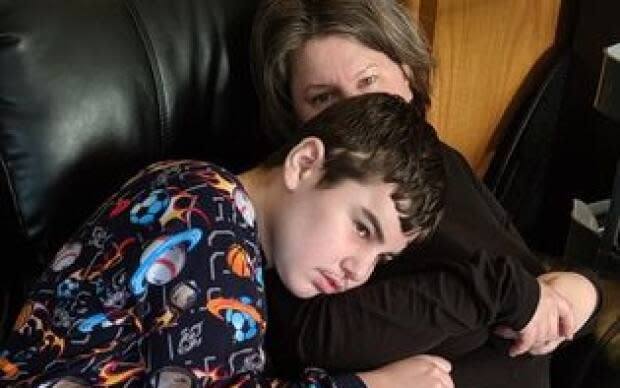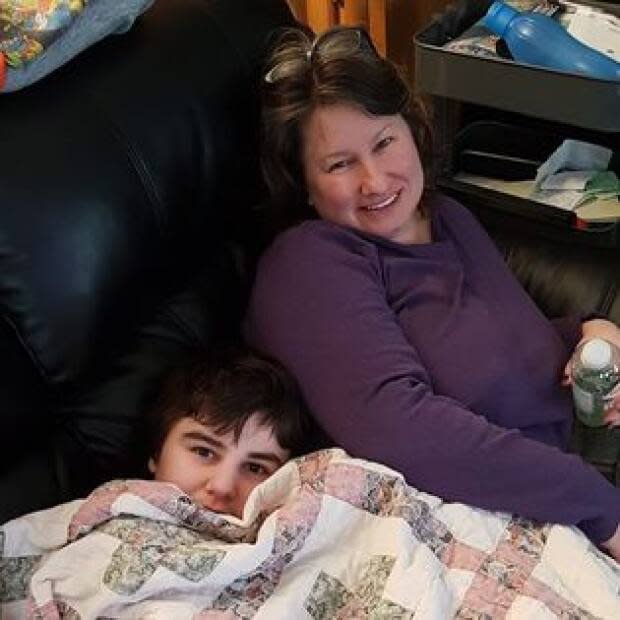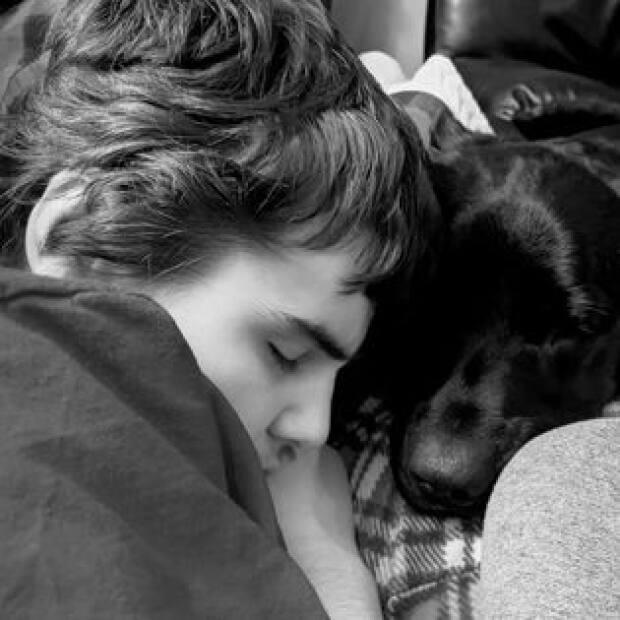Pandemic piles more onto existing 'double layer of exhaustion' for caregivers of kids with complex needs

Jacqui Cameron was used to the toll of her son's daily care. Seizures, feeding tubes, his incontinence and no sleep were all norms in her life.
Now, with the pandemic, the Regina caregiver has even more to worry about.
"We live with a double layer of exhaustion and now COVID is on top of that," she said.
Cameron's 18-year-old son Rylan is home from school due to worries about his health and his cognitive inability to maintain social distance.
"I have lots of sad days and days where I don't even know what to do, but you're so used to doing it anyway so you just suck it up and move on."
Rylan has a severe seizure disorder called Lennox-Gastaut syndrome. He is non-verbal, has a feeding tube and needs complete personal hygiene care. Cameron said he has always been a happy kid, but each day is still a struggle.
'We don't have past trauma, we have ongoing trauma," said Cameron, who Rylan's primary caregiver.
A respite nurse comes once a week for three hours. Cameron said she used to have more workers come in to help, but the risks from COVID are too great.

She said her experiences of caring for a medically complex person offered some preparation for facing a pandemic.
"They've never experienced isolation. Hello. It's what we do," she said.
The Regina mom practises self-care when she can. Sometimes that means hopping on a rowing machine at four in the morning or making time to read for a few minutes. She also has help from her fiancé.
Ernie, the family's basset hound/black lab cross, helps too.
"He will take toys to Rylan to play. If you are crying he launches himself onto you and throws his head across your chest. He is very concerned when Rylan has a seizure and will lick his hands or face," Cameron said.
"He makes us all laugh everyday."

Oddly enough, some things have become easier under COVID. Many doctor's appointments happen over the phone and lab work is done in the home. Topics that used to be taboo are out in the open.
'It became more acceptable for people to have problems and talk about them."
Profound isolation magnified
Cameron and her family are far from alone.
Heidi Prpick Schneider is a caregiver for her daughter in Davidson. Six-year-old Marlee has a genetic neurological condition called Rett syndrome. She requires a lot of help from day to day.
When COVID hit, it magnified an already profound level of isolation.
"You're kind of a slave to your own home," said Prpick Schneider.
Prpick Schneider used to be able to take Marlee for a stroll through the mall, but COVID has taken that away.
She and her husband are keeping Marlee home from school, as even a common cold creates an avalanche of problems for her.
"There are so many elements that come into play when a Rett girl gets sick. Something as simple as a cold and flu is so stressful," Prpick Schneider said.
She said the family hasn't had a good night's sleep in years. Marlee has seizures every night. At one point the only way to get her to sleep for two years straight was to drive for hours in the middle of the night.
Prpick Schneider and her husband have never had a day off. Finding someone to trust with respite was complicated before. Now with COVID, it is nearly impossible.
She said she was getting used to playing the roles of doctor, nurse, physiotherapist, speech and occupational therapist. Now that Marlee is home from school, Prpick Schneider has to somehow find time and energy for another role.
The lists of daily tasks in Marlee's care is long, including everything from toileting and hygiene, to getting her in leg braces to practise walking. Plus there is her school work. She must also constantly be watched for seizures.
"If you want to clean the kitchen or fold the laundry there is not a lot of time to do it. There's not even enough time to use the washroom."
Schneider said her back, shoulder and arms have taken a hit providing this care. She said it's impossible to find time to practise self-care.
She and her husband hunkered down for years before COVID hit to provide Marlee's care. Now, they continue under the pall of a pandemic.
"We just stay a team."
Caregivers have no time to seek help: CMHA Sask.
The Saskatchewan division of the Canadian Mental Health Association (CMHA Sask.) says interest in its program to help caregivers is high, but during a pandemic when caregivers need help the most, there simply isn't the time.
The mental health group said it has been hearing from caregivers at home, nurses, people in Extendicare, people in rural areas, educators and — for the first time — parents at home with their children when school is cancelled.
"People are tired. People are working hard. It's taken a toll,' said Kathy White, co-ordinator of the Caregiver Affected Recovery Education (C.A.R.E.) program.
Getting help to those people is proving a challenge. CMHA Sask. had to rethink the C.A.R.E. program. First, it couldn't be done in person. Caregivers also had no time for a two-day course.
White said the workloads in health care are particularly heavy with the COVID crisis. Many caregivers have clients who are sick themselves, so they have to be extra cautious with their contacts.
C.A.R.E. organizers came up with a one-hour virtual seminar to try to fill the need. Even then, it was tough to come up with ideas to help caregivers take a break.
"They used to take time for walks, go shopping or whatever to relax, but now with COVID those options are not there," she said.
"They are afraid of bringing the virus back to their house."
White said she makes suggestions for things caregivers can do in a crunch. They can be as simple as a few minutes of yoga, breathing exercises, crafting or doing a puzzle.
According to CMHA Sask., caregivers are at risk of compassion fatigue, vicarious trauma and burnout. Addictions are also a concern. White said it may be alcohol and drugs, but it could also be less obvious things like binge-shopping online or unhealthy eating.
White said some also have to care for someone who is violent. PTSD is a reality for many.
She said reaching out to a caregiver in your life in meaningful ways can be a help, even if you can't meet face-to-face.
"If you have nobody to talk to or share that load with, you just feel pure exhaustion."

